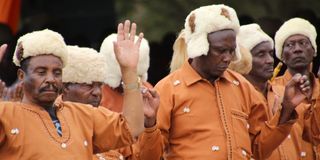Restore crucial role of elders in modern Kenya

Kikuyu Council of Elders hold prayer meetings at Mt Kenya forest in Nyeri county on September 23, 2022.
“If you have a herd of cows without calves, then you have no future,” a member of the Kiama Ki Ama (Kikuyu Council of Elders) told me in Tetu, Nyeri County, recently. He was expressing concern about the hopeless state of many youths in the region who spend their days, as he put it, “idling by the local shopping centers waiting for the next drink”.
Why wouldn’t they, he wondered, work on the farms and earn a livelihood from macadamia, avocado, coffee and other crops. He lamented that it was a struggle to get people with plumbing, carpentry and electrical skills because most of the youth shun such jobs.
My interactions with different groups of elders around the country has woken me up to the reality that we have lost a very important inter-generational bond that held our societies together through a system that had elders at the apex as teachers, mentors and custodians of community values.
Who is the honest arbiter when we are confronted with deep societal challenges? The elders that we relied on for experience, knowledge and wisdom are dismissed as out of touch and old fashioned and their sway in society is tenuous at best.
Artificial Intelligence
I know there are many people that may say that we have embraced modernity and therefore the relevance of elders is no longer relevant in this digital era when we have Artificial Intelligence to sort us out. But the tried and tested structure of the traditional African society and modernity are not mutually exclusive, as some African countries have shown.
Article 89 of the Constitution of Ghana provides for a Council of State (elders) to counsel the President in the performance of his functions and key decisions such as appointments to high office. Here in Kenya, the draft National Government Village Administration Policy, which seeks to establish criteria for appointing village elders and defines their roles, is a step in the right direction.
Among the elders I met in Nyeri are retired professionals, among them lawyers, public administrators, medical doctors, and scientists. Ditto the Njuri Ncheke in Meru that consisted of high-standing members from different professional backgrounds.
We cannot pretend to achieve progress without consulting the elders who are society’s reference point, the bridge between generations and custodians of our knowledge, values and heritage.
In pre-colonial Africa, the council of elders in each community played an advisory role to the chief. They were mediators in conflicts, and established norms that guided behaviour, and the preservation of culture.
Nationwide protests
A lot of attention has rightly been given to the Gen-Z, since last year’s nationwide protests, and there’s a rightful acknowledgement of their stake in the future of the country. But young people no matter their numbers will be rudderless without understanding the organisation and norms of the society they seek to change.
A word of caution to the disparate groups of elders across the country is that they must earn their legitimacy and avoid the trap of political partisanship. Too often they only make the headlines when they are anointing politicians as elders in ceremonies that are partisanship.
There are too many groups across the country masquerading as elders and perennial squabbles and wrangles for leadership positions does not inspire confidence and respect.
The system of admitting elders should continuously evolve with the changing times but their integrity must never be compromised. Elders must reclaim their authority and lead us in healing the nation.
The writer is the founder and CEO of Shining Hope for Communities (Shofco); [email protected]

